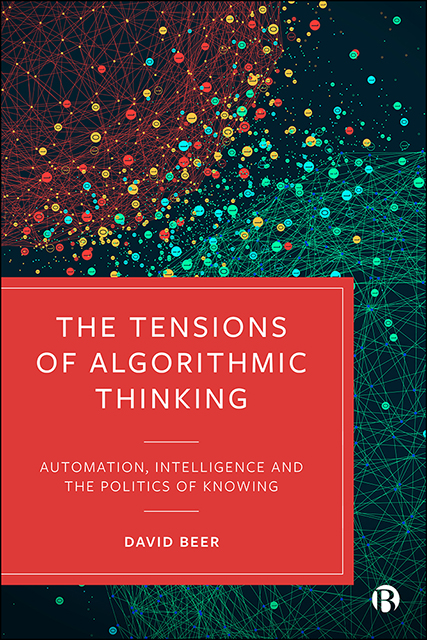Book contents
- Frontmatter
- Dedication
- Contents
- Acknowledgements
- 1 Introduction: Tense Thinking and the Myths of an Algorithmic New Life
- 2 The Pursuit of Posthuman Security
- 3 Overstepping and the Navigation of the Perceived Limits of Algorithmic Thinking
- 4 (Dreaming of) Super Cognizers and the Stretching of the Known
- 5 The Presences of Nonknowledge
- 6 Conclusion: Algorithmic Thinking and the Will to Automate
- References
- Index
1 - Introduction: Tense Thinking and the Myths of an Algorithmic New Life
Published online by Cambridge University Press: 21 June 2023
- Frontmatter
- Dedication
- Contents
- Acknowledgements
- 1 Introduction: Tense Thinking and the Myths of an Algorithmic New Life
- 2 The Pursuit of Posthuman Security
- 3 Overstepping and the Navigation of the Perceived Limits of Algorithmic Thinking
- 4 (Dreaming of) Super Cognizers and the Stretching of the Known
- 5 The Presences of Nonknowledge
- 6 Conclusion: Algorithmic Thinking and the Will to Automate
- References
- Index
Summary
Without wanting to sound too epochal, it could be said that we are living in algorithmic times. We may not want to go so far, and I find myself trying to resist the temptation, but it has become hard to draw any other conclusion. The type of ‘programmed sociality’ to which Taina Bucher (2018: 4) has referred has become impossible to deny, especially as the algorithm ‘induces, augments, supports, and produces sociality’. Different types of algorithms have come to have very large-scale social consequences, ranging from shaping what people discover, experience and consume as they go about their mediated lives, through to financial decisions, trading choices, differential treatment around insurance, credit and lending and then on to housing, border controls and a wide array of other processes and decisions that just simply cannot be listed. Such features of the contemporary landscape have led to the compelling conclusion that this is a type of ‘algorithmic culture’ (Striphas, 2015) cultivated within the structures and relations of an ‘algorithmic society’ (Peeters and Schuilenburg, 2021). Given these circumstances we may even now be living an ‘algorithmic life’ (Amoore and Piotukh, 2016). Such conclusions are certainly merited. Part of the reason we might think of these as algorithmic times, if you would let me stick with that slightly hyperbolic phrasing for a moment longer, is just how long the list would be if we were to try to itemize every single way that algorithms have social or individual consequences. And even then, because of their often-invisible roles and the sheer complexity of overlapping systems, the list would be impossible to complete. The algorithm has become too enmeshed in the social world for it to be untangled from it.
Yet, far from being sleek and uncontested technologies informed by mutually recognized ideals or shared notions of progress, these algorithmic times are fraught with tensions. Algorithmic thinking is tense. This book is concerned with elaborating and conceptualizing some of these competing forces. More than this though, this book argues that these algorithmic times can only really be grasped if we are to engage with the specific nature of these strains. Understanding algorithmic times requires a sustained focus upon the tensions of algorithmic thinking.
- Type
- Chapter
- Information
- The Tensions of Algorithmic ThinkingAutomation, Intelligence and the Politics of Knowing, pp. 1 - 10Publisher: Bristol University PressPrint publication year: 2022

